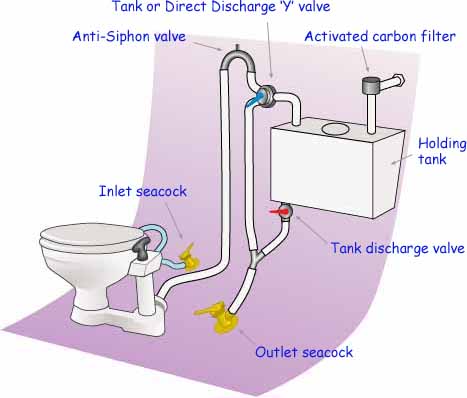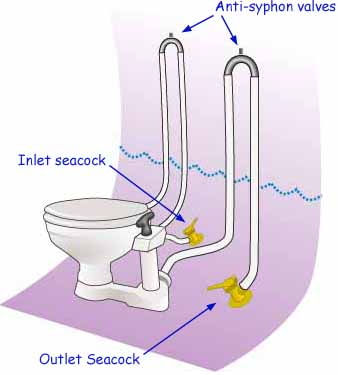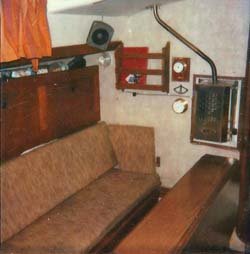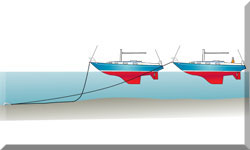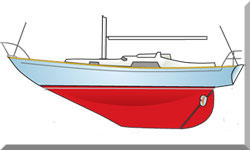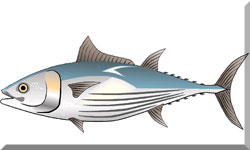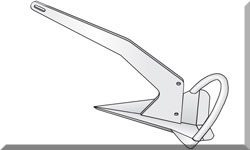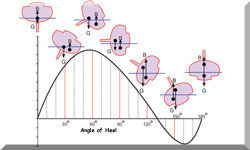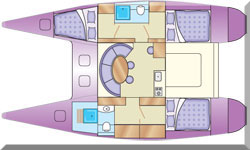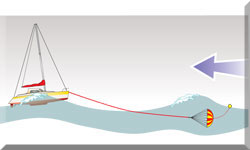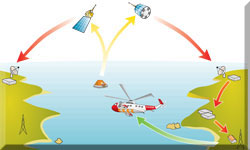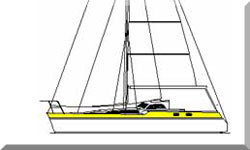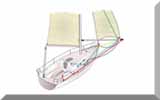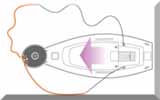- Home
- Choosing Accessories
- Parachute Sea Anchor
- Marine Watermakers
Living With Marine Watermakers
Marine watermakers produce clean, fresh drinking water from seawater from a process known as reverse osmosis. This is a filtration process achieved by forcing a solvent from a region of high solute concentration through a semi-permeable membrane to a region of low solute concentration by applying a pressure in excess of the osmotic pressure.
Whilst it's sadly not a corrective repair option for blistered fibreglass hulls, it is a convenient way of obtaining drinking water from seawater.
Contrary to what you may expect, the plumbing involved in installing a marine watermaker doesn't have to involve additional thru-hull fittings; existing pipes can be utilised to supply the raw water intake, dispose the waste water, and deliver the desalinated water to the tanks.
For example, on Alacazam the intake is tee'd off the seawater intake to the toilet, the waste water is tee'd into the wash-hand basin waste pipe, and the product line is tee'd into the supply to the wash basin, from where it will find its way back to the tanks.
The Components of a Marine Watermaker
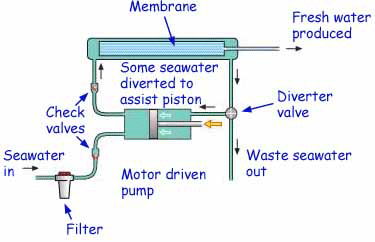 The basics of a marine watermaker
The basics of a marine watermakerArtwork by Andrew Simpson
An electric pump (or in some high output units a belt driven one off the engine) forces seawater through a very fine membrane at high pressure, leaving the salt and other impurities on one side and allowing only clean freshwater to emerge from the other.
Marine watermakers are designed to process clean, open-ocean seawater. Any departure from that standard of cleanliness is likely to cause damage to the membrane or to produce contaminated freshwater.
A hand-operated watermaker packed in your emergency kit, could be a lifesaver...
Looking After Marine Watermakers
Marine Watermakers like to be run often, so they only really come into their own on long offshore passages, or protracted cruising in clean waters.
If they're not going to be used at least once a week, then they need to be treated with a biocide to prevent bacterial growth building up on the filter membrane.
In the tropics, bacterial growth will be more rapid, and a marine watermaker will have to be used every couple of days or so if it's to produce good quality drinking water.
It's lack of use that gives rise to the marine watermaker's reputation for unreliability, rather than overuse. Consequently, when buying a marine watermaker, it's a mistake to get a bigger one than you need.
Big and Thirsty, or Small and Frugal?
There are three main types of unit available, with outputs from around one gallon an hour to over sixty:~
- 12/24v DC, driven from boats domestic supply;
- 110/220v AC, driven by a generator or inverter;
- Belt-driven off the main engine.
With one of the higher output versions, pressurised showers and even plumbed-in washing machines can be used with impunity.
Not surprisingly, the higher the output, the higher the wattage of the seawater pump.
We use a low output version, a 12v Katadyne Powersurvivor 40e, which draws just 4 amps and produces about 5.7 litres of good quality drinking water per hour.
We did think long and hard about buying the larger - and more expensive - model, the Katadyn Powersurvivor 80e Watermaker. This consumes double the electrical power (8 amps) of the 40e but produces slightly more than double the quantity of water (12.9 litres per hour), but is considerably heavier - 34lb against the 40e's 25lb.
Our solar panels and wind-generator can easily keep up with the 40e's meagre electrical appetite and, run every day, the freshwater output is sufficient for two people, and we only need to biocide the membrane when we lay up.
So we turn solar and wind energy into water and, from an environmental point of view, feel pretty smug about it.
It's worth bearing in mind that water produced through reverse osmosis doesn't have the mineral content that our bodies require. Beer, I'm reliably informed, does...
Next: Marine Watermakers or Raincatchers?
Recent Articles
-
Hurley Sailboats: Seaworthy, Classic Cruisers & Buying Guide
Jul 11, 25 02:59 AM
Discover the enduring appeal of Hurley sailboats! Explore their history, robust design, iconic Hurley 22, and essential tips for buying a used Hurley. Your go-to guide for these classic seaworthy yach… -
B&R Rig Explained: Hunter Sailboat Mast Design Pros & Cons
Jul 10, 25 11:08 AM
Demystify the B&R rig, a unique mast design found on many Hunter sailboats. Learn its advantages for cruisers, key features, and potential downsides. -
Hunter Sailboats: Cruising Comfort & Value for Recreational Sailors
Jul 10, 25 09:01 AM
Explore Hunter sailboats' history, design, and performance. Learn about popular models, construction, and what makes them a top choice for comfortable cruising.
